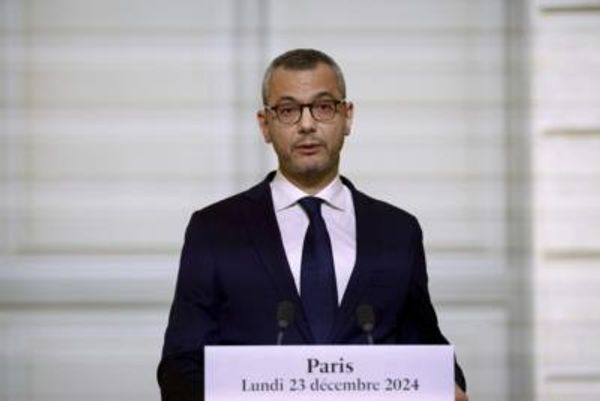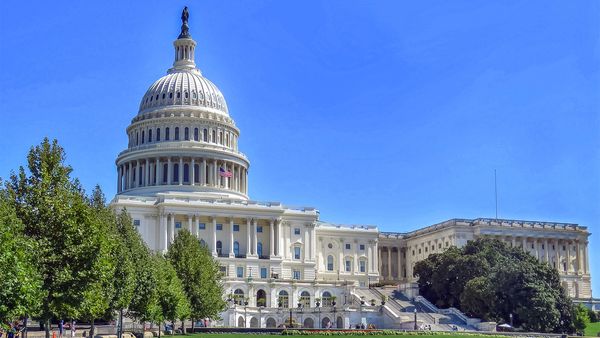
Andy Owen served in the intelligence corps of the British Army, reaching the rank of captain. He completed operational tours in Northern Ireland, Iraq and Afghanistan.
On September 11, 2001, I was receiving my first lesson on how to use the British military’s SA-80 rifle when news of the events in New York reached us. Several instructors on the training team put in requests to go back to their units that same day. It was immediately clear the events of that day had changed the path of history and they wanted to be involved in whatever came next.
The invasion of Ukraine by Russian forces feels like a similarly pivotal moment.
Watching news crews reporting from Kyiv rooftops as the first air raid sirens sounded, and seeing interviews with Ukrainians who could not believe that what they had long expected was now actually happening, it was impossible not to think about those in Baghdad and Basra in 2003, who despite the build-up were similarly dazed. However, when I was deployed to Iraq and Afghanistan with the justification of making the UK’s streets safer, our democracy was being undermined at home.
Russian influence seeped into every corner of the UK’s economic and political landscape (London is known as “the laundry” in Moscow and the long-delayed Russia report concluded that the UK government and intelligence agencies failed to conduct an assessment of Kremlin attempts to interfere with the Brexit referendum). Few questions were asked as the money poured in — communism had been defeated by the West, so what was the threat?
Political scientist Francis Fukuyama argued in his book The End of History and the Last Man that as Western liberal democracy defeated the communism of the Soviet Union, humanity had reached “not just … the passing of a particular period of postwar history, but the end of history as such: that is, the end point of mankind’s ideological evolution and the universalisation of Western liberal democracy as the final form of human government”.
As former members of the Soviet Union aligned themselves with the EU and NATO, we barely noticed the growing, smouldering anger of the Russian political class and security apparatus.
As the first evidence of the return of ghosts of Europe’s brutal past emerged in the Balkans as ethnic and religious conflicts tore apart the previous communist dictatorship in Yugoslavia, NATO snubbed Russia. Acting unilaterally in what Russia still saw as its sphere of influence, it attacked its allies, the Serbs.
Tensions almost boiled over after Russia had been denied a peacekeeping sector independent of NATO at the end of the Kosovo conflict. It was only British General Sir Mike Jackson ignoring the direct orders of his American superior and instead sharing a flask of whisky with his Russian opposite number during a standoff at Pristina airport that avoided direct conflict. Vladimir Putin railed about the NATO bombing campaigns against the Serbs during the Balkans conflict during his recent joint press briefing with the German Chancellor Olaf Scholz.
Post-9/11, our attention was directed elsewhere, fighting the new threat to liberal democracy: Islamic extremism. Political scientist Samuel P Huntington wrote a 1993 essay, “The Clash of Civilisations”, in direct response to The End of History. He argued that the temporary conflict between ideologies was being replaced by the ancient conflict between civilisations.
Despite the over-simplistic Cold War binary thinking, and the use of veiled racist language, the idea that the new threat to liberal democracies was coming from Islam stuck. The global “war on terrorism” followed, creating an axis of evil in an attempt to split the world into two. You were either with us or against us.
Fuelled by hubris, the expansionist liberal democracy project of the UK’s Tony Blair and America’s George W Bush defeated itself in Iraq and Afghanistan. In the aftermath, it soon became clear that the world was a more complex place. China has established itself as a global power with massive influence through its Belt and Road Initiative that had been investing in parts of the world the West had forgotten existed.
The world is not binary, but multipolar. It is a complex web of competing nations tied together by the threads of global trade, financial systems and — with most fragility — the rule of international law.
In 1989 the philosopher John Gray wrote: “The waning of the Soviet system is bound to be accompanied by a waxing of ethnic and nationalistic conflicts — just the sort of stuff history has always been made of.”
Stalin had ruthlessly dislocated entire peoples and relocated them without regard to their histories or traditions. Gray saw in the aftermath of the collapse of the Soviet Union that “age-old enmities and loyalties” were coming back to the surface after decades of totalitarian suppression. For Gray, what we were witnessing in the Soviet Union was “not, then, the end of history, but instead its resumption — and on decidedly traditional lines”.
Putin’s rewriting of the history of Ukraine provided a nationalistic justification for invasion under the guise of protecting the ethically Russian peoples of Ukraine. Putin’s talk of the rights of peoples, however, is a shallow cover for his hunger for his own power and glory and his resentment over Russia’s decline. He is happy to stoke the fires of these age-old enmities for his own ends.
As history resumes, he has become an agent of chaos. Outside of Ukraine, Russia is flooding Serbia with weapons, stirring up ethnic hatred in Bosnia-Herzegovina. Across the Balkans, Russia is threatening states and buying control of strategic assets in key sectors such as media, security, communications and finance.
Putin has become a master at hybrid war, using unconventional tactics and groups — from targeted assassinations to cyber attacks, misinformation campaigns and election interference to the use of mercenaries — to cause deniable chaos.
In 2021 he used the flow of migrants from Belarus into Europe as a weapon to sow disunity. The president of Belarus, Alexander Lukashenko, a Russian client, threatened to flood the EU with armed migrants. Belarusian authorities started promoting tours to Belarus and giving those who bought them visas and then advice and bolt cutters to make their onward journey.
The Wagner Group, the private military organisation seen by many analysts as an unofficial foreign policy tool of the Russian government, has been deployed in Syria and Africa after first showing up in 2014 in Crimea. As the French pulled out of Mali this year, Wagner stepped in.
There is evidence the January coup in Burkina Faso was supported by Wagner mercenaries. Wagner is now in Libya, Mali, Central African Republic (CAR), Sudan and Burkina Faso. By gaining influence in these countries, Russia is able to manipulate conflicts and refugee flows into Europe for decades to come.
Wagner’s activities in Africa provide a fascinating example of Russia’s ability to create illusions to disorient diplomacy. Moscow denies the presence of Wagner in the CAR. However, the Russian government has funded a movie set in CAR called The Touriste, which tells the story of the Wagner Group activities there (minus the atrocities).
The film tells a story of military intervention that, officially, Russia (the film’s sponsor) denies ever happened. Right up to the Ukrainian invasion Putin denied this was his intent while having already recorded his speech that would herald its beginning. Putin has regularly manipulated our beliefs of how the post-Cold War world works.
At the end of the Cold War, we convinced ourselves we had found the one system that was the best for all humanity. We attempted to force that system on others, who had no cultural or historical links to its development and instead unleashed long-suppressed and highly destructive old enmities and loyalties. What we did through naivete and arrogance, Putin is now doing deliberately to further his own ends.
Gray believes that due to the plurality of human needs and illusions, it’s utopian to imagine that any one political system could be good for all. Human nature is an inherent obstacle to advancing political progress. There’s no end to our history of violence.
Instead our ceaseless attempts to try to find some meaning to life invariably drive us into the embrace of religious belief systems and their secular imitations, like nationalism — and, consequently, to continual conflict. In the face of this, Gray believes we need to adopt a form of political realism that accepts that there are political dilemmas for which there are simply no solutions.
There is a plurality of human values that determines many ways of living, and these values — and those that hold them — will inevitably clash. We must search for ways of living together despite this. While that’s the aim, we must accept that the reality is that war is followed by periods of peace, followed by war.
One of the most powerful speeches in these past few days came from the Kenyan ambassador to the UN Security Council, Martin Kimani. He highlighted that most African countries did not draw their own borders, they were drawn in European capitals with little thought to the nations they were cleaving apart. At independence, many were separated from those with which they had deep cultural, linguistic and historical bonds. The desire to unite those separated across state lines was understandable.
However, instead of looking backwards and using “dangerous nostalgia” and violence to redraw those borders, Kenya looked forward. This was not because it was happy with its borders but because it wanted to forge greater integration and unity with its neighbours and continental partners through peaceful means.
Ukraine may be for Putin what Iraq and Afghanistan were for the West. However, to extend the periods of peace between future wars we should aspire to Kimani’s integration and unity, but this should be accompanied by a political realism that sees through our own illusions and the carefully crafted illusions of those in competition with our values who are prepared to release our worst impulses for their own gain.







